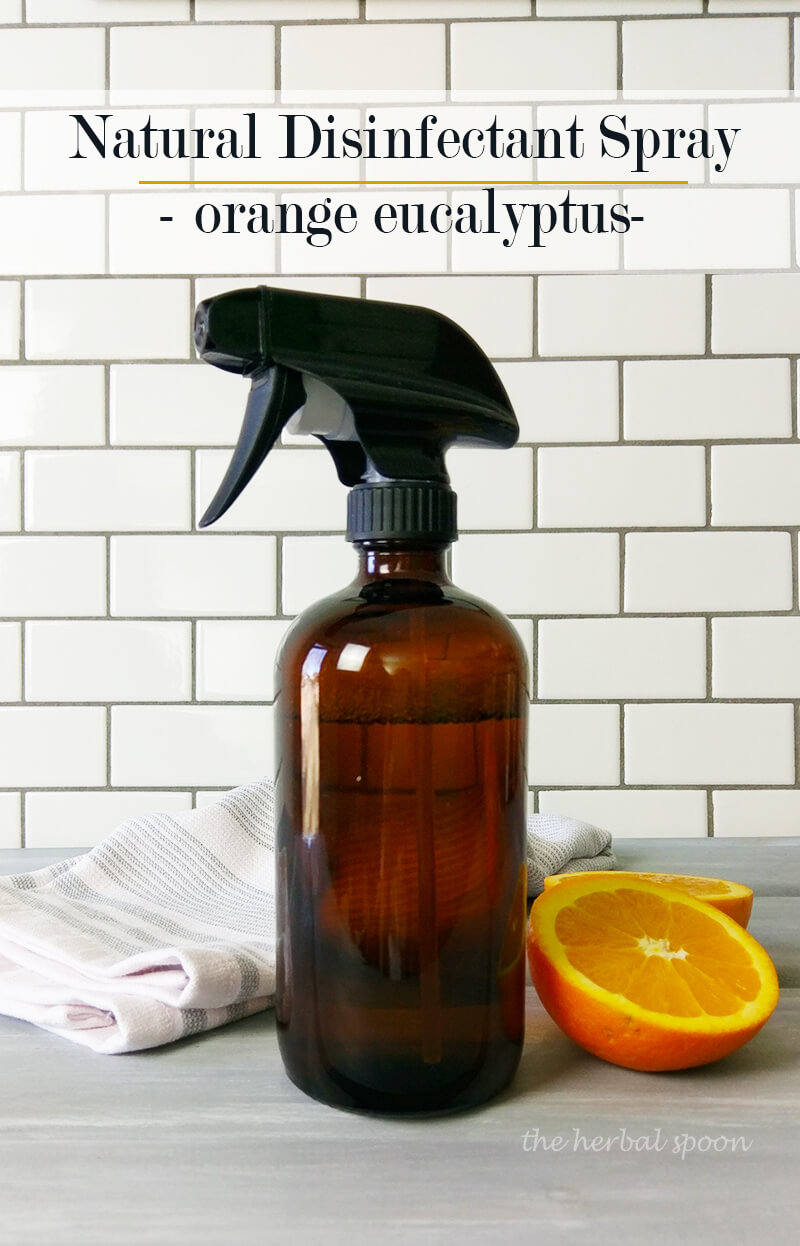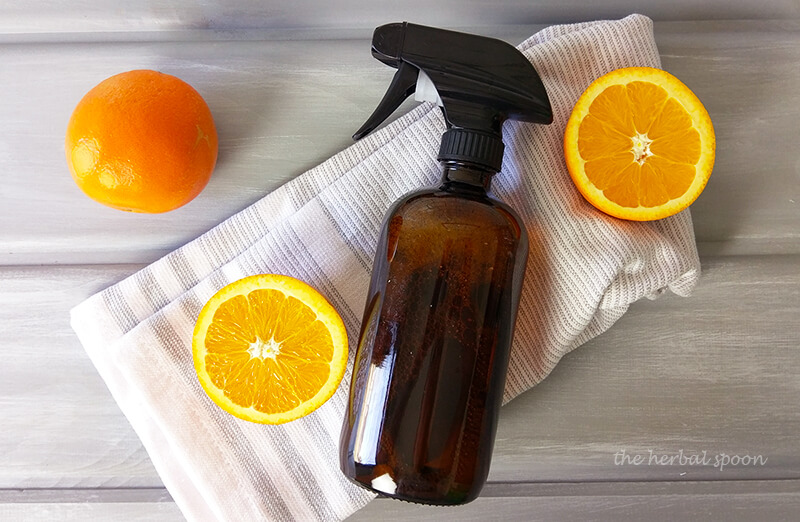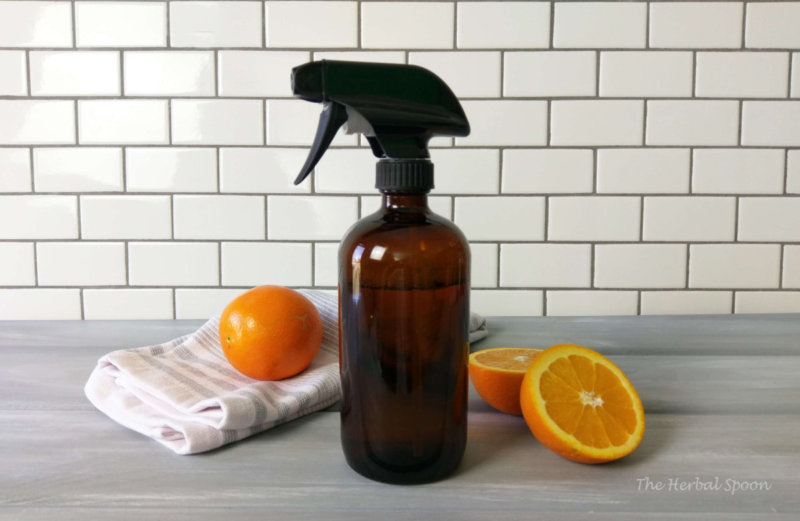
Maybe I’m weird, but I have a thing for fabulous smelling cleaners like this citrus splash all-purpose spray. As a housekeeper for over 12 years I’ve now traded the noxious fumes for natural scents like lemon, orange, and pine needle. Lemony fresh countertops and minty toilets are my jam. I use homemade cleaners like this disinfectant spray with essential oils to power away germs. And make my lungs happy.
Disinfectant Spray Woes
I have a bone to pick with cleaning commercials. You know, the ones that say your bathroom isn’t clean unless it smells like bleach? Or how about those happy people spraying disinfectant cleaners on the baby’s high chair? Conventional cleaners aren’t all they’re cracked up to be.
Conventional disinfectant sprays warn that they can cause skin and eye damage. The cleaner has ingredients linked with asthma, brain cell damage, and breathing issues. Oh and did I forget to mention cancer?
Which Essential Oils are Best for Cleaning?
Certain essential oils are germ fighting ninja’s, without the questionable health effects. This orange eucalyptus disinfectant spray uses essential oils for a great smelling, effective cleaner. Other citrus oils like lemon, grapefruit and lime are also good choices in a cleaner. And if you don’t like the crisp smell of eucalyptus, then fir needle, pine, tea tree oil and pine are fabulous at disinfecting surfaces.
Thyme oil contains thymol, a natural and potent antiviral. So potent it’s one of the only EPA recommended natural disinfectants for certain viruses and other pathogens (when used as directed). This recipe uses the amount of thymol necessary to meet the EPA and CDC standards, assuming your essential oil has at least 40% thymol content. If you’re not sure, look at that batch’s GCMS report for the breakdown of chemical constituents. And if that essential oil company doesn’t have GCMS reports to verify purity and potency I recommend switching to a company that does (like Plant Therapy).
There are plenty of natural disinfectant options without resorting to chlorox, chlorine bleach, or other harsh chemicals.
Citrus Oils that Need Trashed
I had no idea until recently that essential oils expire. Citrus essential oils oxidize and lose their therapeutic effectiveness after about a year. Older essential oils can also cause sensitization or phototoxicity, aka skin burns (Nesmith, 2014). While senior citizen essential oils may be past their prime for medicinal use, they still work for cleaning.
Instead of pitching that citrus oil, put it to use in this natural disinfecting spray. Fresh orange oil de-greases, sanitizes surfaces and I use it in my all purpose cleaner.

Vodka: Not Just for Cocktails
I don’t drink, but I have a gallon of vodka in my kitchen. Alcohol not only extracts an herbs beneficial properties for tinctures, but is an effective homemade disinfectant cleaner. Since alcohol evaporates quickly, this helps the cleaner dry fast while it ups the disinfecting power. It also helps disperse the essential oils into the cleaner, and preserve the spray.
Best Disinfectant Cleaners
According to the CDC you need a 60-90% alcohol concentration to tackle bacteria, fungus, and viruses. While I don’t like alcohol in my homemade hand sanitizer, it works beautifully in a disinfectant spray. Vodka usually starts at a 40% alcohol concentration, so you’ll need at least 120 proof vodka in this recipe.
Isopropyl alcohol or rubbing alcohol ranges from about 70-90% alcohol and is usually cheaper than vodka. Everclear can be harder to come by but it’s about as close to 100% alcohol as you can get. Any of these can work depending on what’s available. It can be hard to make a diy disinfectant with alcohol levels that high, so the essential oils fill in the gap. The vinegar, alcohol, and antimicrobial essential oils combine forces to make a germ whopping cleaning solution.
Don’t worry, the house won’t smell like a bar. I expected the vodka smell to overpower the spray, but it isn’t too noticeable because of the essential oils. Rubbing alcohol would also work if that’s what you have. It does smell strong at first, but alcohol evaporates quickly.
Hydrogen Peroxide: A Non-Alcohol Alternative
If your cleaning products like to skip the alcohol, hydrogen peroxide makes an effective disinfectant. Unlike other sanitizing cleaning sprays, hydrogen peroxide cleaners need much less active ingredient. According to the EPA and Centers for Disease Control, just .5-1% hydrogen peroxide will kill most pathogens, including viruses. This means that the end product needs to have a .5-1% concentration of hydrogen peroxide. I’ve included this option in the disinfectant spray recipe.
Is it Safe for Kids?
I use natural cleaners to protect the health of my family, especially my little ones. Eucalyptus get a bad rap for causing breathing issues in babies, but there’s more to the story. While I wouldn’t recommend diffusing eucalyptus essential oil in a baby’s bedroom, the small amounts used in a cleaner don’t have the same effect. Eucalyptus cleaner in a open area is safe for most people of all ages.
What About Breathing Issues?
Certain essential oils can make asthma worse. However researchers have found eucalyptus can help asthma symptoms. Other research has shown that the D-limone in citrus oils can worsen asthma (Buckle, 2015). If your child has serious health issues like asthma or epilepsy, then clean when they’re out of the room and use ingredients that are safe for their condition.
For the majority of kids though, a eucalyptus orange sanitizer spray is a safe way to clean the house (Franklin Institute of Wellness, 2018).

Natural Orange Eucalyptus Disinfectant Spray
Ingredients:
- 1 tsp orange essential oil (lime, lemon, grapefruit or bergamot will also work)
- 20 drops eucalyptus essential oil or 12 drops Thyme essential oil
- 1/2 cup alcohol (at least 120 proof vodka, 90% isopropyl alcohol, or everclear)
- White vinegar
- 16 oz spray bottle
Instructions:
- Pour the alcohol and essential oils into the spray bottle.
- Add the vinegar until the bottle is almost full. Leave enough room for the sprayer.
- Put the spray top on and shake vigorously to combine.
- Shake well before each use, and spray surfaces around the house to disinfect, like faucets, doorknobs, and light switches.
Disinfectant Spray Without Alcohol
While I don’t recommend sniffing this cleaner regardless, some find that the high alcohol levels cause some issues. If you prefer not to use alcohol (or can’t find the right kind), then hydrogen peroxide works well. Alcohol and vinegar can mix, but hydrogen peroxide and vinegar shouldn’t be mixed (usually).
When combined they form a completely different chemical with it’s own properties: peracetic acid. On it’s own this acid works great as a disinfectant. However, household concentrations of vinegar and hydrogen peroxide aren’t strong enough to make peracetic acid that’s potent enough to neutralize microbes. Instead we’re left with an ineffective disinfectant.
This recipe works best when used on clean surfaces. Hydrogen peroxide breaks down and won’t disinfect microbes when there’s dirt and dust on the surface.
Ingredients:
- 1 tsp orange essential oil (lime, lemon, grapefruit or bergamot will also work)
- 20 drops eucalyptus essential oil OR 12 drops Thyme essential oil
- 1/3 cup and 1 tsp 3% hydrogen peroxide
- Distilled water
- 16 oz spray bottle
Instructions:
- Pour the hydrogen peroxide and essential oils into the spray bottle.
- Add the water until the bottle is almost full. Leave enough room for the sprayer.
- Put the spray top on and shake vigorously to combine.
How to Use DIY Eucalpytus Disinfectant
Unlike certain disinfectant cleaners … cough*lysol*cough … this one doesn’t need washed off of surfaces before using them. I use this to sanitize my countertops and cutting board. It also works well on stainless steel since it doesn’t leave a soapy residue and dries fast . You can also spray and leave it on toilet seats, door knobs, and other surfaces where germs like to party.
References
- Buckle, J. (2015). Clinical Aromatherapy Essential Oils in Healthcare. St. Louis, MO. Churchill and Livingstone.
- Franklin Institute of Wellness. (2018). Essential Oils in Your Child’s School. Retrieved from https://franklininstituteofwellness.com/essential-oils-classroom/ on March 25, 2019.
- Nesmith, R. (2014). Do Essential Oils Expire? Retrieved from https://blog.planttherapy.com/blog/2014/05/28/do-essential-oils-expire/
- EPA. (2020, March 26). Pesticide Registration: List N: Disinfectants for Use Against SARS-CoV-2. https://www.epa.gov/pesticide-registration/list-n-disinfectants-use-against-sars-cov-2
- Science Direct. (N.D.). Peracetic Acid. https://www.sciencedirect.com/topics/pharmacology-toxicology-and-pharmaceutical-science/peracetic-acid
I have everything I need to make this! Thanks for the recipe. 🙂 I’m totally using it…
Great idea and I love that you can use common ingredients!
Making some of this today after I had 2 pukers up in the night last night! Thanks!
Such amazing, clean ingredients! I love homemade cleaners, and I’m definitely gonna try this out!
I can’t bear with vinegar smell. Can we sub with water for the alcohol disinfectant recipe ? Or any adjustment of alcohol amount ? I usually use 70% rubbing alcohol.
You could use distilled water, it might not last as long though. The vinegar helps with cleaning grease and grime, but it will still disinfect with just the alcohol and essential oils.